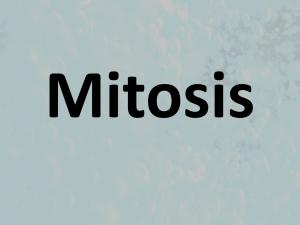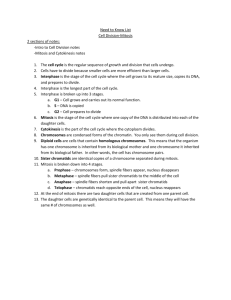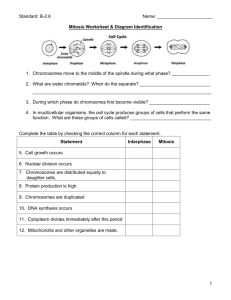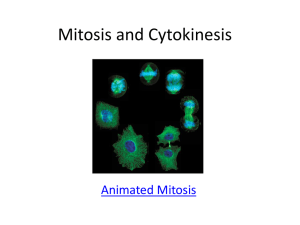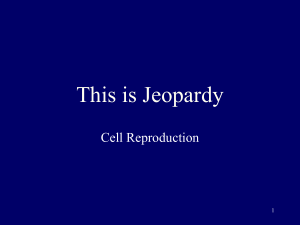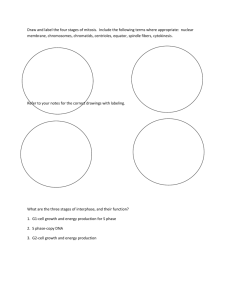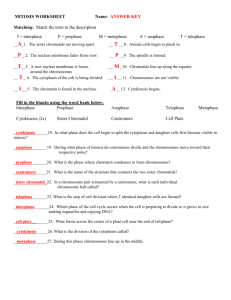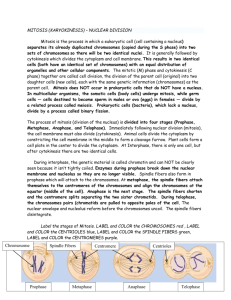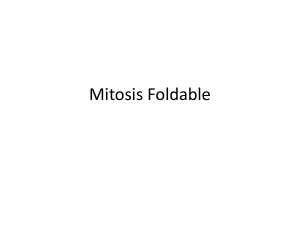THE CELL CYCLE WORKSHEET
advertisement
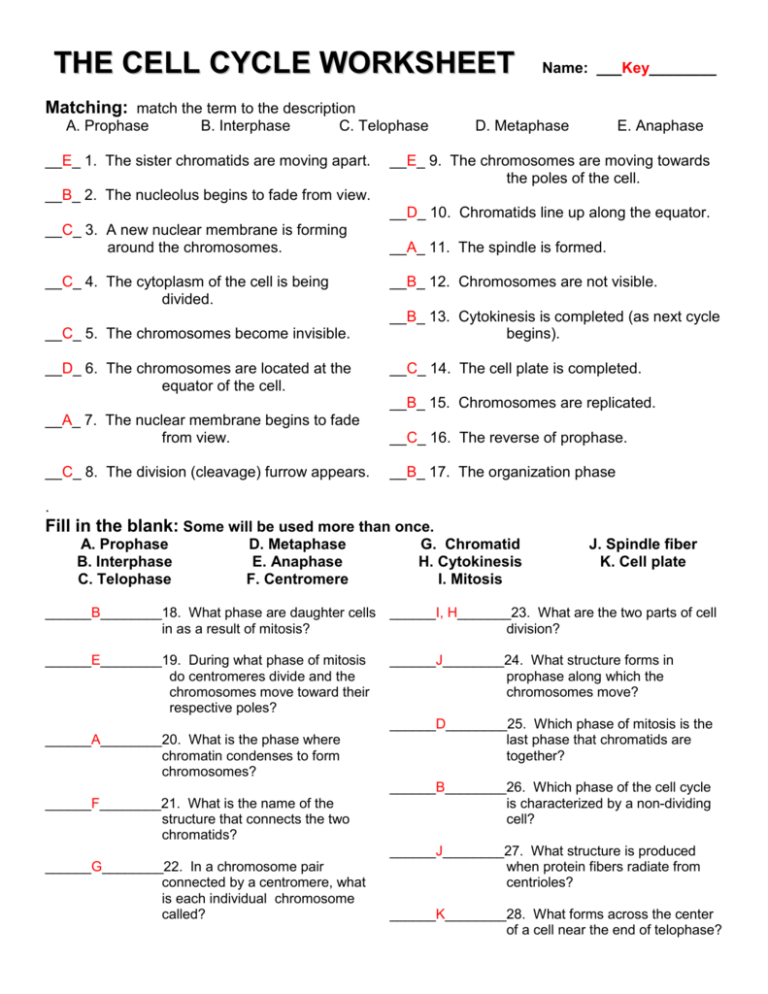
THE CELL CYCLE WORKSHEET Name: ___Key________ Matching: match the term to the description A. Prophase B. Interphase C. Telophase __E_ 1. The sister chromatids are moving apart. D. Metaphase E. Anaphase __E_ 9. The chromosomes are moving towards the poles of the cell. __B_ 2. The nucleolus begins to fade from view. __D_ 10. Chromatids line up along the equator. __C_ 3. A new nuclear membrane is forming around the chromosomes. __C_ 4. The cytoplasm of the cell is being divided. __C_ 5. The chromosomes become invisible. __D_ 6. The chromosomes are located at the equator of the cell. __A_ 11. The spindle is formed. __B_ 12. Chromosomes are not visible. __B_ 13. Cytokinesis is completed (as next cycle begins). __C_ 14. The cell plate is completed. __B_ 15. Chromosomes are replicated. __A_ 7. The nuclear membrane begins to fade from view. __C_ 16. The reverse of prophase. __C_ 8. The division (cleavage) furrow appears. __B_ 17. The organization phase . Fill in the blank: Some will be used more than once. A. Prophase B. Interphase C. Telophase D. Metaphase E. Anaphase F. Centromere G. Chromatid H. Cytokinesis I. Mitosis J. Spindle fiber K. Cell plate ______B________18. What phase are daughter cells in as a result of mitosis? ______I, H_______23. What are the two parts of cell division? ______E________19. During what phase of mitosis do centromeres divide and the chromosomes move toward their respective poles? ______J________24. What structure forms in prophase along which the chromosomes move? ______A________20. What is the phase where chromatin condenses to form chromosomes? ______F________21. What is the name of the structure that connects the two chromatids? ______G________22. In a chromosome pair connected by a centromere, what is each individual chromosome called? ______D________25. Which phase of mitosis is the last phase that chromatids are together? ______B________26. Which phase of the cell cycle is characterized by a non-dividing cell? ______J________27. What structure is produced when protein fibers radiate from centrioles? ______K________28. What forms across the center of a cell near the end of telophase? ______B________29. The period of cell growth and development between mitotic divisions? ______H________30. What is the phase where cytokinesis occurs? The diagram below shows six cells in various phases of the cell cycle. Note the cells are not arranged in the order in which the cell cycle occurs. Use the diagram to answer questions 1-7. ____________________1. Cells A & F show an early and a late stage of the same phase of the cell cycle. What phase is it? prophase ____________________2. Which cell is in metaphase? C ____________________3. Which cell is in the first phase of M phase (mitosis)? A ____________________4. In cell A, what structure is labeled X? centriole ____________________5. List the diagrams in order from first to last in the cell cycle. DAFCEB ____________________6. Are the cells depicted plant or animal cells? animal a. Explain your answer. Cells are round, no cell plate, pinching b. If it were the other type of cell what would be different in the diagrams? Square, cell plate ____________________7. 8. What is the longest phase of the cell cycle? interphase Why is mitosis important? Duplicate nuclear material for 2 daughter cells 9. Predict what would happen if an individual had faulty spindle fibers. Daughter cells would end up with the wrong number of chromosomes 10. Predict what would happen if cytokinesis was skipped. Cells would have too many chromosomes; cells wouldn’t function properly because they would be too big. 11. What is the difference between cell plate and cleavage furrow? below 12. Draw a cell and label the: nucleus, centrioles, spindle fibers, pole of cell, equator of cell Below Equator of cell pole
